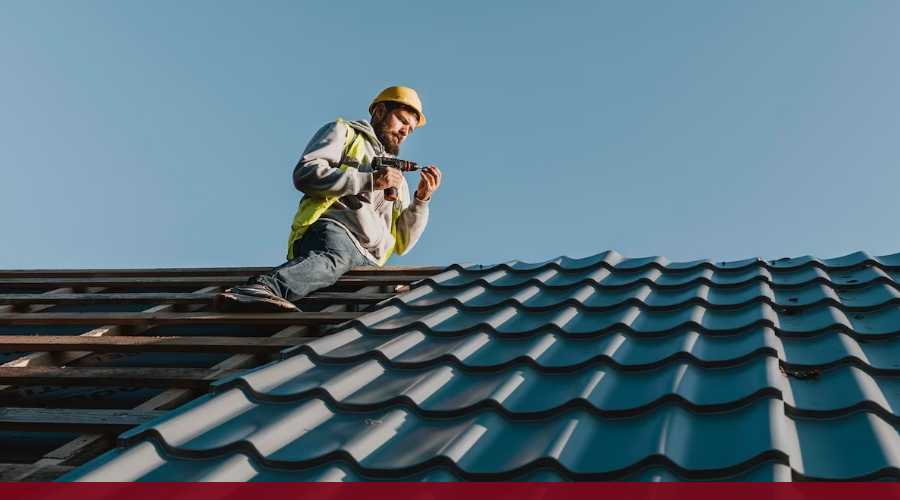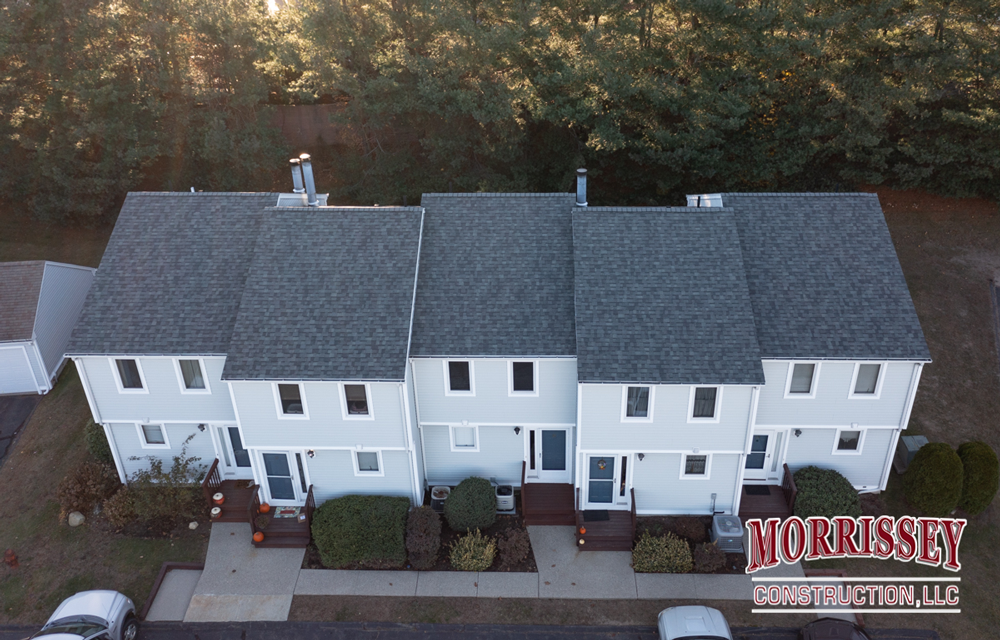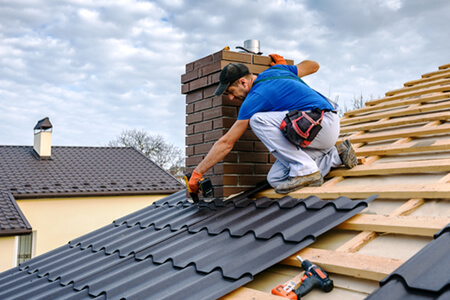
1. Lack of Proper Licensing and Insurance
Licensing and insurance are fundamental requirements for any reputable roofing contractor. These credentials affirm the contractor’s adherence to industry standards and regulations and protect homeowners from liability in the event of accidents or property damage during the project. Hiring a contractor without proper licensing and insurance exposes you to significant risks, including substandard workmanship, potential legal issues, and financial liability for on-site injuries or damages.
Here’s how to verify the licensing and insurance of a roofing contractor:
- Request Proof: Ask contractors to show their current licensing documents and insurance certificates.
- Check with Local Authorities: Contact your local licensing board to confirm the contractor’s license is valid and active.
- Verify Directly with the Insurance Company: Call the insurance provider to ensure the policy is in force and covers the necessary aspects of your project.
2. Suspiciously Low Quotes
A quote can become suspicious if it drastically undercuts the market average, suggesting potential shortcuts in materials or workmanship. Contractors who offer bids significantly below market rates can compromise the quality of materials or omit essential services, leading to higher long-term costs and potential roofing failures. Additionally, an extremely low bid might indicate a contractor’s lack of experience or a desperate need for work, both scenarios that could negatively impact the quality and durability of your roof.
Here’s how to evaluate roofing quotes:
- Compare Quotes: Obtain quotes from reputable contractors to establish a benchmark for average costs.
- Scrutinize the Details: Ensure each quote breaks down the materials, labor, and other costs.
- Ask Questions: Don’t hesitate to ask contractors why their bid is lower than others you’ve received. Their answers can provide insights into what exactly you are paying for.
3. Poor Communication
If a roofing contractor is not prompt in responding to inquiries, is vague in discussing project details, or is inconsistent in providing updates, it can lead to misunderstandings and unsatisfactory results. Effective communication ensures your expectations are met and the project proceeds smoothly without unexpected issues or delays.
Here’s how to gauge the communication quality of a roofing contractor:
- Response Time: Evaluate how quickly the contractor replies to your initial and subsequent inquiries.
- Clarity and Detail: Notice whether the contractor provides clear, detailed explanations of the work process and listens to your needs.
- Consistency: Check if the contractor consistently communicates with you throughout the consultation and planning stages and if they are reachable when needed.

4. Negative Reviews and Bad Reputation
Contractors with numerous negative reviews or a history of unresolved complaints should be approached cautiously, as they may not deliver the quality of service you expect. Online reviews and testimonials from previous customers can provide valuable insights into the contractor’s reliability, workmanship, and professionalism.
Here’s how to assess a roofing contractor’s reputation:
- Read Online Reviews: Online reviews have become increasingly influential in consumer decision-making. According to recent surveys, 93% of consumers consider online reviews before purchasing. Check trusted platforms like Yelp, Google, or Angie’s List for customer reviews and see what past customers have experienced.
- Check the Better Business Bureau: Visit the BBB website to view the contractor’s rating and any reported complaints.
5. High-Pressure Sales Tactics
Tactics such as insisting on immediate decisions, offering limited-time deals, or pressuring you to sign contracts without thorough consideration can indicate a lack of transparency and integrity. A reputable roofing contractor will provide the information and time needed to make an informed decision without resorting to aggressive sales tactics.
Here’s how to handle high-pressure sales tactics from roofing contractors:
- Take Your Time: Don’t succumb to pressure; take the necessary time to review proposals and gather information.
- Get Second Opinions: Seek additional quotes and opinions from other contractors to compare and validate the information provided.
- Trust Your Instincts: If you feel uncomfortable or rushed during the sales process, it’s best to step back and reassess the situation before making any commitments.
6. Lack of References or Portfolio
A roofing contractor’s lack of references or portfolio can raise concerns about their experience and credibility. Reputable contractors typically have a portfolio showcasing their past projects and can provide references from satisfied customers. Without this evidence, assessing the quality of their work and reliability is challenging, leaving you vulnerable to subpar results or project delays.
Here’s how to address a lack of references or portfolio from a roofing contractor:
- Request a Portfolio: Ask the contractor if they have photos or examples of their previous roofing projects to review.
- Seek References: Inquire about past clients who can vouch for the contractor’s workmanship and professionalism.
- Consider Alternatives: If a contractor cannot provide references or a portfolio, consider exploring other options with a proven track record.

7. No Written Contracts
The absence of a written contract or a contract lacking in detail can pose significant risks when hiring a roofing contractor. A written contract is a legally binding agreement outlining the scope of work, project timelines, materials to be used, payment terms, and warranties. Misunderstandings can arise without a clear and comprehensive contract, leading to disputes, project delays, and unsatisfactory outcomes. Vague contracts leave room for interpretation, making it difficult to hold the contractor accountable for meeting agreed-upon terms.
Here’s how to address the issue of no written or vague contracts:
- Insist on a Written Contract: Ensure all project details are documented in writing before work begins.
- Review Carefully: Read the contract thoroughly to ensure it includes specific information about the project scope, timelines, payment schedule, and warranties.
- Seek Legal Advice: Consult a legal expert to review the contract and ensure it protects your interests.
8. Lack of Local References or Community Presence
Contractors without local references may lack accountability and disappear after completing the job, leaving you without recourse if issues arise. Conversely, roofing contractors with established roots in the community have a reputation for upholding and prioritizing customer satisfaction and quality workmanship.
Here’s how to address the issue of a lack of local references or community presence:
- Ask for Local References: Request references from past clients in your area to gauge the contractor’s reputation and performance.
- Check Community Involvement: Research whether the contractor participates in local events, sponsors community initiatives, or is affiliated with reputable organizations.
- Consider Local Contractors: For added peace of mind and assurance of reliable service, prefer well-known and respected roofing contractors in Glastonbury, CT, like Morrissey Construction.
9. Large Deposits or Upfront Payments
While it’s customary for contractors to require a deposit to secure materials or schedule work, excessive upfront payments can leave you vulnerable to financial risk if the contractor fails to deliver on their promises. Reputable contractors typically request a reasonable deposit, around 10%-30% of the total project cost, with the remaining balance due upon completion of the work. Familiarize yourself with typical deposit amounts for roofing projects to ensure you’re not overcharged.
Why You Should Avoid DIY Roof Repairs
Attempting to repair or replace your roof seems like a cost-effective solution, but it can lead to costly mistakes and safety hazards. Hiring a professional roofing contractor is safer and more practical for several reasons.
Safety Risks
Roofing is inherently dangerous, requiring climbing ladders, navigating steep slopes, and handling heavy materials. Without proper training and equipment, DIYers risk serious injury or even death from falls or accidents. Research shows that falls from roofs account for many construction-related fatalities each year, highlighting the grave risks involved. Professional roofing contractors undergo extensive safety training and have the tools and equipment to perform the job safely.
Lack of Expertise
Roofing is a specialized skill that requires knowledge of various roofing materials, techniques, and building codes. DIYers may lack the expertise to properly install or repair a roof, leading to costly mistakes and subpar results. Professional roofing contractors undergo rigorous training and have years of experience working on various roofing projects. They understand the nuances of different roofing systems and can recommend the best solutions for your needs.
Quality Concerns
A poorly installed roof can lead to many problems, including leaks, water damage, and structural issues. DIYers may lack the skills and attention to detail to ensure a quality installation. Professional roofing contractors have the expertise to properly assess your roof’s condition, identify any underlying issues, and execute repairs or replacements to industry standards. By hiring a contractor, you can rest assured that your roof will be installed correctly the first time, minimizing the risk of future problems.
Legal and Insurance Implications
DIY roofing projects may void manufacturer warranties and violate building codes, leading to potential legal and insurance issues. In many areas, permits are required for roofing work, and failure to obtain them can result in fines or penalties. Additionally, DIYers may not be covered by insurance in the event of accidents or damage to their property or neighboring properties. Professional roofing contractors carry liability insurance and adhere to local building codes, providing homeowners protection and peace of mind.
Cost Considerations
While DIY projects may seem cost-effective upfront, they can cost more in the long run due to mistakes, rework, and additional repairs. Professional roofing contractors have access to wholesale pricing on materials and can complete the job efficiently, saving you time and money. Additionally, hiring a contractor ensures that the job is done right the first time, eliminating the need for costly repairs or replacements down the road.

Tips for a Successful Roofing Project
Ensuring a smooth and successful roofing project requires careful planning and effective communication with your contractor. Here are some essential tips to help you navigate the process and achieve the best results.
Clear Communication
Communicate your expectations, preferences, and any concerns you may have upfront. Regularly check in with your contractor to stay informed about the progress and promptly address any issues.
Set Realistic Expectations
Understand that roofing projects may encounter unexpected challenges or delays due to weather conditions, material availability, or unforeseen issues. Set realistic expectations regarding project timelines and be flexible in accommodating any necessary adjustments. Trust in your roofing contractor’s expertise to navigate these challenges effectively.
Prepare Your Property
Before the roofing project begins, prepare your property to minimize disruptions and ensure a smooth workflow. Clear the work area of any obstacles or debris, and secure any loose items to prevent damage during construction. Communicate with your contractor about any specific requirements or concerns you may have regarding property preparation.
Trust the Professionals
Once you’ve hired a roofing contractor, trust in their expertise and allow them to do their job. Avoid micromanaging or interfering with the work process, as this can disrupt workflow and lead to unnecessary delays. Instead, focus on providing support and assistance as needed and trust that your contractor will deliver high-quality results.
Conduct a Final Inspection
After the roofing project is complete, conduct a final inspection with your contractor to ensure all work has been completed satisfactorily. Inspect the roof for any signs of damage, defects, or incomplete work, and immediately address any concerns with your contractor. By conducting a final inspection together, you can ensure that issues are resolved promptly before completing the project.
Maintain Regular Maintenance
Regular upkeep is essential once your new roof is installed to prolong its lifespan and prevent costly repairs. Schedule annual inspections with your roofing contractor to identify and address any issues early. Keep gutters clean, trim overhanging branches, and promptly address any signs of damage or wear to ensure your roof remains in optimal condition for years.
FAQs
How long does a typical roofing project take to complete?
The timeline for completing a roofing project varies depending on factors such as the roof’s size, the job’s complexity, and weather conditions. Generally, an average-sized home roof can take 2 to 5 days to complete. However, it’s essential to discuss project timelines with your contractor upfront and factor in potential delays due to inclement weather or unforeseen issues.
What is the best way to handle disputes with a roofing contractor?
In disputes with a roofing contractor, addressing the issue promptly and effectively is essential. Start by resolving the dispute directly with the contractor through open communication and negotiation. If direct resolution is not possible, consider seeking mediation or arbitration to facilitate a resolution. Additionally, you can contact local consumer protection agencies or regulatory bodies for assistance in resolving disputes and ensuring fair treatment.
Are there specific warranties I should look for when hiring a roofing contractor?
Yes, it’s crucial to inquire about the warranties a roofing contractor offers before hiring them for your project. Look for warranties covering materials and workmanship, typically 5 to 25 years. A comprehensive warranty assures that the contractor stands behind their work and will address any issues that arise during the warranty period. Review the warranty terms carefully and ask the contractor any questions to ensure you understand the extent of coverage provided.
Is it necessary to obtain permits for roofing projects?
In many areas, local building codes require permits for roofing projects. Permits ensure the work meets safety and quality standards and may involve inspections to verify compliance. Your roofing contractor should be familiar with local permitting requirements and can help you navigate the process. Be wary of contractors who suggest skipping permits, which could result in legal and financial consequences.
What should I do if I encounter unexpected issues or delays during the roofing project?
Despite careful planning, unforeseen issues or delays may arise during roofing. If you encounter any unexpected challenges, communicate promptly with your contractor to address the issue and develop a solution. Maintain open lines of communication throughout the project and be flexible with timelines as needed. A reputable contractor will work with you to resolve any issues efficiently and ensure the project stays on track.
Trust the Experts: Choose Morrissey Construction for Your Roofing Needs!
When it comes to roofing projects, the risks associated with DIY efforts far outweigh the potential savings. Hiring a professional roofing contractor ensures safety, expertise, and quality workmanship, protecting both you and your property. Morrissey Construction stands out as a top-rated roofing contractor in Glastonbury, CT, offering a comprehensive range of services, including roof repairs, replacements, and installations. With years of experience and a reputation for delivering superior results, Morrissey Construction is your trusted partner for all roofing needs.
Don’t compromise on the integrity of your roof – contact us today for a consultation!


